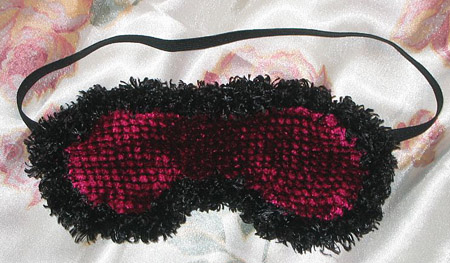Knitting Hats and other Headware
One of the cool things about using a circular loom
is how easy it is to knit hats! Knitting looms often
come in four or five sizes to match the different size
heads (adult, youth, infant, etc.) In addition to hats,
the looms can knit other types of headgear.
The following is a list of the types of hats worn. You
can knit each type of headgear listed below. Free
patterns are noted for each type of headgear. You may
have to convert the pattern for the loom. Converted
patterns will be up shortly.
For a complete list of headgear, see the Wikipedia.
-
 Hats generally have a brim
all the way around the rim. It is either placed
on the head or secured with hat pins. Some hats
are gender specific.
Hats generally have a brim
all the way around the rim. It is either placed
on the head or secured with hat pins. Some hats
are gender specific.
Patterns
To learn more about the different parts of a hat and how to knit them and the correct sizing for a hat on the loom, please click on the tabs below. To learn about organizations that take chemo hat donations, see knitting for charity for more information.
The following are the parts of a hat. You may or may not knit each part.
- Crown. The crown is the the portion of a
hat covering the top of the head. When given
sizing for the crown, you will need to knit a
length of approximately
2/3 of the amount given.
For your convenience a chart has been provided
in the next tab for when you haven't been given
a crown size.
- Brim. The brim is material, often stiff and
sometimes projecting outward, from the bottom
of the hat's crown horizontally all around the
circumference of the hat. Here is one method
for making brims:
- Knit double the number of rows you'd like the brim to be
- Reach inside the loom and pull up the bottom row to the top of the loom
- Put a loop on each peg (you will now have two wraps on each peg
- Knit the bottom wrap over the top wrap for each peg., completing the brim
This technique also works for socks, clipper & sleeve cuffs and purse & bag brims.
- Sweatband. The sweatband is the inside part
of the hat which touches the top of the
wearer's head. Often this is not included in a
knit hat unless the hat has been felted.
- Hatband. The hatband is a leather strip, ribbon, or string at the intersection of the crown and brim to hold the hat's size. This is not always included in knitted hats though it is not uncommon to see one on a felted knitted hat.
Head sizes and shapes differ from country to
country with the smallest heads being in the Far
Eastern countries and the largest in Germany. Head
shapes can be very round or oval, with the Far
Eastern countries having a rounder head and the
Western countries having a more oval shape.
To determine your hat size, take a measuring tape
and place it around the circumference of the
head, slightly above the ears.
The following information was compiled from
Martha Stewart's website. It provides an estimate
for American head sizes by age and/or gender.
| Average American Head Sizes | |||
|---|---|---|---|
| Head Size | Age | Circum. | Crown |
| Newborn | ≤ 6 mo | 14-17 in | 8-10 in |
| Infant | 6-12 mo | 16-19 in | 11-12 in |
| Child | 1-3 yrs | 18-20 in | 11-12 in |
| Child | ≥ 3 yrs | 20-22 in | 13-14 in |
| Woman | Adult | 21-23½ in | 13-15 in |
| Man | Adult | 22-22½ in | 14-16 in |
Which loom should you use when making a hat? Here's a quick table for large gauge looms for hats from size infant to adult large. Length knitted is the amount of knitting total on the loom before binding off.
| Round Loom Hat Chart | |||
|---|---|---|---|
| No. of Pegs | Knifty Knitter | Length Knitted | Age Group |
| 24-26 | KK Round Blue
KK Long Pink |
7-8 in | Infant |
| 24-26 | KK Round Blue
KK Long Pink |
7-8 in | Infant |
| 30-32 | KK Round Red | 7.5-9.5 in | Youth |
| 36-38 | KK Round Green
KK Long Yellow |
8.5-10 in | Adult S-M |
| 40-42 | KK Round Yellow | 9-10.5 in | Adult M-L |
The following table will help you determine which loom to use if you are given the hat size (child (≥ 3) through adult).
| 30 | 32 | 34 | 36 | 38 | 40 | 42 | 44 | 46 | 48 | 50 | 52 | 54 | |
| Inches | 201/2 | 203/4 | 211/4 | 215/8 | 22 | 221/2 | 223/4 | 231/4 | 235/8 | 24 | 241/2 | 243/4 | 251/4 |
| Other | XS | S | M | ML | L | XL | XXL | ||||||
| US | 61/2 | 65/8 | 63/4 | 67/8 | 7 | 71/8 | 71/4 | 73/8 | 71/2 | 75/8 | 73/4 | 77/8 | 8 |
| Aus/UK | 63/8 | 61/2 | 65/8 | 63/4 | 67/8 | 7 | 71/8 | 71/4 | 73/8 | 71/2 | 75/8 | 73/4 | 77/8 |
| Europe | 52 | 53 | 54 | 55 | 56 | 57 | 58 | 59 | 60 | 61 | 62 | 63 | 64 |
-
 Caps are usually soft and
usually have no brim. They sometimes have a peak
such as in a baseball cap. Married or older women
wore caps made of muslin from the 18th through the
19th centuries indoors or under their bonnet.
Caps are usually soft and
usually have no brim. They sometimes have a peak
such as in a baseball cap. Married or older women
wore caps made of muslin from the 18th through the
19th centuries indoors or under their bonnet.
Patterns
-
 Bonnets are usually worn by
women and girls outdoors. Their construction has a
tie under the chin and peaks or visors. Bonnets
have been worn by men but this is rare today. The
construction of male bonnets were different from
hats in that they were soft and had no brim. Today
it would be referred to as a cap.
Bonnets are usually worn by
women and girls outdoors. Their construction has a
tie under the chin and peaks or visors. Bonnets
have been worn by men but this is rare today. The
construction of male bonnets were different from
hats in that they were soft and had no brim. Today
it would be referred to as a cap.
Patterns
-
 Hoods are soft head coverings
that are either an integral part of a larger
garment, e.g., an coat, shirt or sweater or a
separate form of headgear.
Hoods are soft head coverings
that are either an integral part of a larger
garment, e.g., an coat, shirt or sweater or a
separate form of headgear.
Patterns
- Hooded Scarf (shown)
- Knifty Knitter Magic Scarf
- Knitted Hood
- Hooded Poncho
- Loom-knit Danbury Hooded Sweater Jacket
-
 Masks are over part or all of
the face. They may be worn to hide the face,
protect the face or keep the face warm. Everyone
from the military to travelers to skiers to
revelers wear masks.
Masks are over part or all of
the face. They may be worn to hide the face,
protect the face or keep the face warm. Everyone
from the military to travelers to skiers to
revelers wear masks.
Patterns
-
 Wigs are made from various
natural and man-made fibers and are worn to
disguise baldness and hair thinning or as part of a
costume.
Wigs are made from various
natural and man-made fibers and are worn to
disguise baldness and hair thinning or as part of a
costume.
Patterns
-
 Circlets & Crowns
Circlets (aka fillets) are essentially a crown
without the points or headcovering, just a band
around the head. They eventually evolved into a
crown.
Circlets & Crowns
Circlets (aka fillets) are essentially a crown
without the points or headcovering, just a band
around the head. They eventually evolved into a
crown.
Don't you wear a crown or tiara while you knit? The Queen of Knitting? Well if you don't, try one of the patterns below. The first is a crown for a man and the second is a crown for a woman.Patterns






